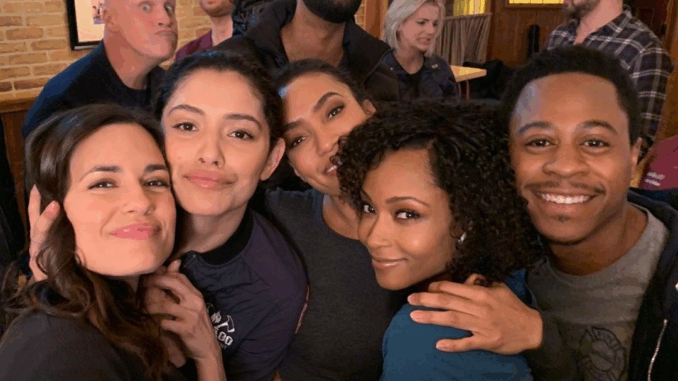
For years, One Chicago has thrived on the strength of its interconnected storytelling, pulling together Chicago Fire, Chicago P.D., and Chicago Med into a universe that feels as alive and unpredictable as the city itself. Viewers tune in each week not just for the individual dramas of Station 51, Intelligence, or the ED, but for the rare and explosive moments when those worlds collide in crossovers. Yet if recent behind-the-scenes whispers are to be believed, the next era of One Chicago could push this formula to its absolute limit. Instead of small crossover stunts or a single case spilling from one show to another, insiders suggest the writers are preparing to unleash a narrative thread so dangerous, so all-consuming, that it will challenge the survival of every single department simultaneously. At the heart of these rumors is the idea of a shared enemy, a force strong enough to target the firefighters, the detectives, and the doctors all at once, threatening the very foundation of Chicago itself.
The concept of collapse is not new to One Chicago. Every season has flirted with catastrophe, whether it was a towering inferno, a serial killer on the loose, or a hospital under siege. But those storylines always stayed contained within their individual series, letting fans watch one crisis at a time. This rumored shift would break that mold completely. Imagine an antagonist who doesn’t just set fire to a building, but manipulates public systems to create chaos across the board—fires that overwhelm 51, violent crime waves that push Intelligence to breaking point, medical shortages and ER overloads that leave Chicago Med reeling. Instead of three series existing in parallel, all of them would be dragged into the same downward spiral. The city wouldn’t just be in crisis, it would be on the verge of collapse.
Fans online have already been spinning theories about how such a storyline could unfold. Some believe the writers might finally introduce a crime syndicate that infiltrates every layer of Chicago, from corrupt politicians to underground networks that compromise emergency services. Others think the story could lean into cyberterrorism—one coordinated attack that disables communications, power grids, and even the hospital systems that keep the city alive. The truth, of course, remains locked behind closed doors, but the speculation alone has sent shockwaves through the fandom. After years of separate but interlocking narratives, a fully unified, citywide collapse arc would be unlike anything the franchise has attempted before.

The implications for the characters themselves could be devastating. On Chicago Fire, leaders like Boden would be forced to push his team into missions beyond anything they’ve trained for, not just saving lives from accidents but braving coordinated assaults meant to overwhelm them. Severide, known for chasing dangerous arson cases, could find himself face-to-face with enemies who light fires as part of a broader plan, not just out of malice but as a strategy of war. For Chicago P.D., Hank Voight and his Intelligence unit could be backed into a corner, trying to outmaneuver a network far more organized and dangerous than any street gang or corrupt official they’ve encountered before. The moral dilemmas would multiply: how do you fight crime when the entire city is being weaponized against you. And in Chicago Med, the doctors would be pushed into the ethical grayest of territories—triaging impossible numbers of patients, rationing supplies, and making split-second calls on who can or cannot be saved when chaos spreads faster than they can respond.
Perhaps most chilling of all is the idea that these three branches of One Chicago might not all survive intact. Collapse, by definition, doesn’t leave everything standing. Could fans be forced to say goodbye not just to beloved characters but to entire institutions? Rumors suggest the possibility of a finale where at least one of the core institutions—Firehouse 51, Intelligence, or Chicago Med’s ED—might be permanently changed, merged, or even closed. Such a move would not only devastate fans but permanently alter the DNA of the franchise. And maybe that is exactly what the writers are daring to do—tear apart what has been built over a decade, only to rebuild it in a form fans never saw coming.
There’s also a more emotional layer to the speculation. One Chicago has always been about family as much as it is about duty, and collapse would mean those bonds are tested like never before. What happens when Fire and Med can’t reach each other because the systems connecting them are down? What happens when Voight has to choose between working with the hospital to save his team or bending the rules to strike at the enemy directly? These personal fractures could become as dangerous as the external threat, turning allies into opponents, at least temporarily. Fans who have followed these characters for years may finally see the kind of emotional and moral implosions that can only come when everything is stripped away.

From a storytelling perspective, this rumored collapse arc could be the boldest gamble the franchise has ever taken. Crossovers already demand careful coordination between production teams, but a season-long shared enemy would require a level of integration rarely seen on network television. It wouldn’t be enough to sprinkle characters into each other’s episodes—the narrative would have to weave seamlessly across three shows, week after week, in a way that feels organic rather than forced. If successful, it could set a new bar for franchise television, proving that a shared universe can go beyond gimmicks and deliver something epic. If it fails, it risks alienating viewers who prefer their shows contained, turning One Chicago’s strength into a weakness.
Fans are already split in their reactions. Some are thrilled at the idea of a citywide threat that would finally give the franchise the kind of blockbuster crossover event it’s been hinting at for years. Others worry that such a story might stretch credibility too far, turning grounded, character-driven drama into something closer to superhero spectacle. Yet even those skeptics admit they’ll tune in, if only to see how far the writers are willing to push the envelope.
For now, NBC and Wolf Entertainment remain silent, fueling even more curiosity. No official announcement has been made, no hints dropped in interviews, and yet the chatter refuses to die down. Perhaps that silence is intentional, a way of keeping fans guessing, a way of ensuring that when the truth is revealed—whether it’s at the start of the next season or in a shocking mid-season twist—it lands with maximum impact.
What is certain is that One Chicago is at a crossroads. After more than a decade of loyal viewership, the franchise cannot simply repeat the same formula forever. The idea of a collapse, of a shared enemy uniting or destroying every show at once, might just be the evolution the series needs. It’s risky, it’s audacious, and it might break fans’ hearts in the process. But if the rumors are true, the streets of Chicago will never look the same again—and neither will the shows that brought them to life.